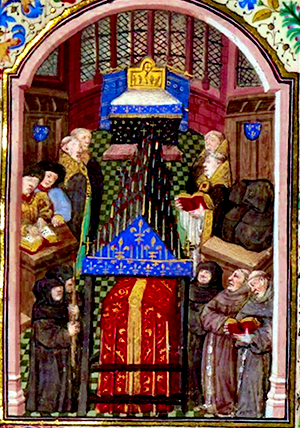
 EACH YEAR the Archdiocese of Kansas City (KS) hosts a vocation day for area 5th grade students and as part of the day, Archbishop Joseph Naumann celebrates Holy Mass for all of the students. Quite naturally, he speaks to them in his homily about vocations, both the universal call to holiness given to each person as well as the particular vocation God gives to each Christian in order to live out his call to holiness.
EACH YEAR the Archdiocese of Kansas City (KS) hosts a vocation day for area 5th grade students and as part of the day, Archbishop Joseph Naumann celebrates Holy Mass for all of the students. Quite naturally, he speaks to them in his homily about vocations, both the universal call to holiness given to each person as well as the particular vocation God gives to each Christian in order to live out his call to holiness.
I wasn’t able to attend the Mass this year, but I heard afterward from the mother of one of my choristers (Matthias) that at one point in the homily, the archbishop asked the students what their purpose in life was. One student answered with Matthew Kelly’s to become the best version of yourself. The archbishop acknowledged that was true, but that he was looking for something else, so he asked the question again.
Matthias shot his hand in the air and the archbishop called on him. With a volume that only a 5th grade boy can muster, he rattled off that his purpose in life was to know, love and serve God in this life, and to be happy with Him forever in the next. Archbishop Naumann acknowledged that this was what he wanted to hear, straight from the catechism. Matthias’ mother told me she beamed with pride thinking she had done her duty to make sure her son knew his purpose, but when she asked him about it afterward he told her that “part of the credit goes to Dr. Tappan, who makes us tell him at every choir practice what our purpose in life is.” I must confess that I felt a great amount of pride upon hearing that. It is true that I ask each one what his purpose in life is, both on that particular day and for all eternity. I often wonder if what I teach in choir has much of an eternal effect on the lives of my choristers—I hope it does.
In a similar vein, my wife’s aunt and uncle, cattle ranchers in the beautiful Kansas Flint Hills, have five children, four of whom are grown now, but the father told me once that every single day, when they awoke at 5:30 in the morning and put on the first pot of coffee, he asked his children to tell him what their purpose was in life, and they had to be able to answer as Matthias did. The father told me recently that he still asks that question daily of his two grown sons who work on the farm. He also asks his daughters whenever they visit.
About 10 years ago, the middle of their five children, a daughter of only 15 years, was diagnosed with cancer and the family watched as she succumbed to the agonizing disease over the course of more than a year. Still her father asked her that question. What is your purpose in this life? He told me that he also had long conversations with her about the glory of Heaven and how she was truly blessed because she would arrive there before the others. He told her she would have to pray that the rest of the family made it.
As the cancer worsened, she refused morphine as much as possible, offering up the pain for the conversion of sinners and for the holy souls in purgatory. As her body became so emaciated she stopped having visitors for a time because she was embarrassed by how she looked. It wasn’t long, though, before she asked for visitors again and told her family it was just the devil working on her vanity. The night before she died her family gathered in her hospital room to pray the Rosary and the Stations of the Cross and afterward she told her family that that was the last time that they would pray together, that she was going to go home. She died peacefully the next day as her mom drove home from the hospital and her father was driving to it. It is the only time I can ever remember a parent being filled with joy that his child had made it “home.” I will never forget having had the privilege of chanting the In pardisum at the funeral.
As we remember all of the faithful departed during this month of November, be mindful of the immense power that you as a choir director having in orienting your choristers toward Heaven, so that they, too, might one day be counted among the faithful departed.

